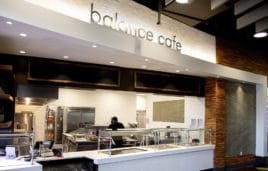
Marissa Burk can often be found sitting in the campus dining hall, chatting with her friends while enjoying a plate full of chicken tenders with barbecue sauce and fries. Thrive, which is free of the top 8 allergens plus gluten, is a favorite dining spot at Michigan State University for Burk, who is allergic to peanuts, tree nuts, soy, sesame and peas.
With college, “I really wanted that traditional dining hall experience,” says Burk, an accounting major. She notes that it’s not often that someone with food allergies can have chicken tenders and fries safe from allergens or cross-contamination.
Safety is key when setting up protocols so that students like Burk have the freedom to walk in and eat confidently at Thrive, which opened in summer 2019, says Michigan State’s registered dietitian Kelsey Patterson. “No matter what kind of need you have, we want to make it an equitable experience,” she says.
Even after extensive research into college accommodations, parents of allergic students often worry about whether their kids will be safe, especially when living far from home. The good news is that food allergy awareness is growing significantly on campus. There are now shining examples of colleges whose leadership truly “get” the huge difference access to safe and nutritious meals means for the busy student with allergies.
”College is hard enough. The last thing a student should have to worry about is where to get a meal,” notes Sean Carroll, senior director of marketing and auxiliary operations at Vanderbilt University.
Allergic Living examines the accommodations and protocols of four colleges that really go the distance for students with food allergies and celiac disease. They are: Vanderbilt in Nashville, California Polytechnic State University in San Luis Obispo, Michigan State in East Lansing, and University of Massachusetts Amherst.
These colleges get an “A” for the big effort in undergoing rigorous training programs with MenuTrinfo. That company is a longtime leader in food allergy and gluten-free training, offering courses for food handlers accredited by the American National Standards Institute (ANSI), and expert knowledge of commercial kitchens and allergy-friendly meal preparation.
More than 1,000 U.S. colleges to date have passed MenuTrinfo’s AllerTrain accredited training. It involves education on food allergies and gluten-free diet needs, protocols for preventing cross-contact, advice on implementing procedures, and how to recognize and treat a severe allergic reaction.
Three of the four standout colleges for food allergies we feature offer dining venues certified as Top 8 allergen-free and gluten-free under MenuTrinfo’s Kitchens with Confidence (KWC) program. More than two dozen U.S. colleges have received this certification, which involves in-depth auditing and allergen testing of dining prep practices, including measures to avoid cross-contact. Betsy Craig, MenuTrinfo’s president and CEO, says it’s no small feat to pass this program. “With the audit and certification, we really put them through their paces,” she says.
Following is Allergic Living’s inside look at the four colleges we chose as among the top allergy-accommodating schools.
Vanderbilt U

Free-from options: The Rand Dining Center houses the venue “2301,” which is KWC-certified free of the top 8 allergens plus gluten, while the Kissam Kitchen is KWC-certified gluten-free, peanut- and nut-free. Three of the campus’s other dining halls and pub are all certified peanut- and nut-free.
One of the most popular dining spots at Vanderbilt is 2301. Lines often snake out the door of the free-from venue, which features fresh ingredients and buildable sauté and salad bowls, as well as fresh smoothies.

The space was converted from a pizza outlet, and Vanderbilt’s registered dietitian Emily Suttle says it has seen a 36 percent increase in sales since it opened in spring 2018. In opening a dining location that is free of milk, eggs, peanuts, nuts, soy, fish, shellfish, wheat and gluten, Vanderbilt wanted students with restricted diets to feel like they could get a variety of food in a safe environment in a way that feels welcome, Suttle says.
“A really cool thing about 2301 is that students with food allergies can just walk up and order just like anybody else,” she says. In addition to the free-from dining spots, the college also adopted a mobile order-taking system for customized allergy-friendly meals.
For its programs and commitment, MenuTrinfo named Vanderbilt “Best Overall Food Allergy Champion for Universities” in its allergy awards for 2021.
California Polytechnic State U

Free-from options: Balance Café, KWC-certified free of the top 8 allergens plus gluten. Students can also find a variety of allergy-friendly and gluten-free grocery items at three campus markets, from fresh produce to frozen entrées and granola bars.
Kelsey McCourt, registered dietitian and sustainability coordinator at Cal Poly, says providing a safe place to eat with plenty of options is important. A new building provided the perfect opportunity for Cal Poly to create Balance Café, which is certified free of the top 8 allergens and gluten, and avoids using sesame. The location, which opened in September 2020, has plenty of appeal for students with or without food allergies. It offers a rotating menu with global dishes and comfort food such as pancakes or chicken with curry sauce, all made with simple, wholesome ingredients.
Preparation and cooking are done in a dedicated kitchen at Balance, which has its own pots and dishes, cooking equipment, dedicated freezer, storage and dishwasher. Keeping all foods and supplies separate from anything containing an allergen streamlines the process, making it easier for the staff, McCourt says. For example, staff members don’t have to worry about accidentally grabbing peanut butter, because only nut-free butters are stored in the self-contained space.

Having an entire dedicated platform allows Cal Poly to go farther in ensuring allergen-free meals and a safe place to eat than the designated top 8-free and gluten-free stations previously in use, McCourt says.
Natasha Lee, a fourth-year Cal Poly student with multiple food allergies, appreciated the options available at the top 8 free station in a campus dining hall where she dined before Balance opened. Lee felt safe eating there, knowing that the food was prepared in a space without cross-contact. “It was so nice to just go and pick out what I wanted every day,” Lee says.
Especially when students eat at a dining spot other than Balance, McCourt says they should inform staff about their allergies, so the kitchen can take the right precautions. The school also makes nutrition and allergen information easy to access on iPads in the dining locations.
Michigan State U

Free-from options: Thrive at Owen Hall, KWC-certified free of the top 8 allergens plus gluten. Allergy-friendly packaged foods available in 9 dining halls. Plus, new free-from mobile ordering in 2021.
When deciding to open Thrive, the mindset at Michigan State was: why not make the space free of the top 8 allergens and gluten, instead of just one or two? Registered dietitian Gina Keilen had been working with chefs to remove allergens from recipes for a few years, for instance, substituting oil for butter. This expanded meal choices for students with restricted diets. So they had a slate of recipes, they just needed a free-from venue to serve them, notes dietitian Kelsey Patterson.
Burk, the chicken tenders aficionado in her third year, says of Thrive’s food: “People are surprised at how tasty it is.” She finds having a variety of allergy-friendly meal options that appeal equally to those without diet restrictions helps to raise awareness about food allergies among the student population.
Michigan State also keeps packaged allergy-friendly items in other dining halls, such as dairy-free yogurt and gluten-free bread. Three of the dining halls are “nut-conscious,” which means they are not “certified” nut-free. But nothing with peanuts or tree nuts is cooked in those locations.
“It gives a level of comfort that nothing with nuts is being cooked there,” Patterson says.
U of Massachusetts Amherst

Free-from options: Students pre-order meals from planned-out menus based on allergy and dietary needs. Gluten-free stations at 3 dining commons. Packaged GF bread in all 4 dining halls. Plus, new free-from mobile ordering option in 2021.
The attitude of college dining staff can make a difference in an allergic student’s confidence in the meals being served. Anna Stedtler, a fifth year continuing senior at UMass Amherst says the work the college has put into ensuring she can safely eat shows they really care. Stedtler, who is allergic to egg, milk, spinach and scallops and follows a vegan diet, found it a big help to work with a university dietitian.
“It is crucial to make things as easy as possible for [allergic] students,” she says. “Because if students don’t want to take the time or feel ‘comfortable,’ they might take an unnecessary risk with meals.”
Communication is a vital part of accommodating students with food allergies, says registered dietitian Dianne Sutherland, the nutrition manager at UMass Amherst. Those conversations begin with an initial Q&A session with the dietitians, and meeting the chef. They move on to an introduction to resources like the online menu system, which highlights the top allergens plus corn and sesame.
The student, dietitian and kitchen staff work on personalized menus (drawn from free-from recipes to ensure correct ingredients). Then students are encouraged to text with questions. “Communication is key,” she says.
The AllerTrain staff training at the UMass campus helps to ensure that discussions are followed with proper processes. These include prepping a meal in the allergy safe area, then covering and labeling it for the student. MenuTrinfo honored UMass Amherst with its “Best Food Allergy Training for Universities” award for 2021.
Training and Certification
Each of these schools get a refresher via the AllerTrain program at least yearly (depending on hiring levels). Plus, they have at least one Certified AllerTrainer on site, who assists in leading the training.
“Training helps raise awareness, and helps employees ‘get’ the severity,” UMass’s Sutherland says. Having the results of the allergy test at the program’s end helps her to see who needs further work. Sutherland has been using AllerTrain at UMass since 2018. She had wanted to add a third-party certified program to bolster the food allergy training that she provides.
MenuTrinfo’s Craig says the schools also have access to MenuTrinfo’s database that verifies ingredients as free-from the top allergens and gluten. Cal Poly’s McCourt says that’s one of the biggest benefits of their partnership. The dietitians use the information about what allergens exist and whether there is cross-contact from the manufacturer to input and update information in their school’s nutrition websites.
KWC’s “Certified Free From” designation for free-from college dining spots provides an important level of security for universities and students, Craig says. The audit process for certification includes:
- Analyzing all procedures including in-house process and policies with vendors.
- An in-person audit with over 120 check points that include: ordering process, utensils used, separation of cooking areas, dedicated washing areas, food storage, and potential cross-contact issues.
- Checking every recipe and ingredient from the suppliers.
- And helping to create standard operating procedures.
“We take responsibility for everything from loading dock to table top,” Craig says.
Once a location has earned KWC’s “Certified Free From” seal, which requires monthly testing for top 8 allergens, along with an annual review. Any new menu items also must go through MenuTrinfo for verification.
While the auditing can be a big undertaking, Suttle says it has been well worth it for the students’ peace of mind and for the university. Having KWC’s certification seal lets everyone know that Vanderbilt’s efforts to provide allergen-free meals go many steps beyond just not cooking with allergens. “It really, truly is free-from,” she says.
The accommodations add to the school’s attractiveness to prospective students and put a human face on dining services, says Vanderbilt’s Carroll. “It’s the right thing to do. The fact that we do take care says a lot about our character, and I think students appreciate it.”
Advice for Parents, Students
MenuTrinfo’s Craig advises parents and students to find out what a college is doing to accommodate students, including:
- Do they have regular training specific to food allergies?
- Is there a dedicated free-from space?
- What are the protocols for food handling and storage?
- To whose standards are they being held?

Michigan State’s Patterson emphasizes that it’s especially important for students with allergens outside of the top 8 to work with the campus dietitian on how best to navigate the dining system. That may mean creating order-ahead meals or working together to search beyond the top allergen flags in the nutrition system.
Burk encourages fellow food-allergic students to start small until they know what works for them. She started her first year at Michigan State sticking to meals only at the certified free-from Thrive. But as she grew skilled at her process of checking menus and ingredients on nutrition websites, and grew comfortable advocating for her dietary needs, she branched out to other dining halls.
“It is important to be able to advocate for yourself, and people are there to help you,” Burk says.
Related Reading:
Sidebar: Food Ordering App That Meets Allergic Students’ Needs
4 Colleges Where Food-Allergic Students Find Inclusion
Dorms to Dining Halls: Students on the Good and the Bad
This Allergic Life: Dating in College
Going Vegetarian With Nut Allergies





